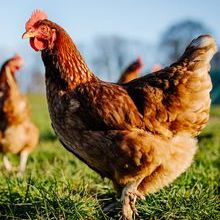Selective Breeding: An alternative strategy to control avian infectious disease
09 September 2021

Selective breeding has the potential to provide an accurate, environmentally friendly and cost-effective approach to controlling disease in poultry.
Poultry and eggs are becoming a leading source of protein as demand increases with urbanisation, higher salaries and growing population sizes. Despite an urgent need to sustainably increase poultry production, managing avian infectious diseases to protect both animal and human health remains a challenge.
Dr Psifidi’s team in collaboration with other researchers at the Royal Veterinary College and research institutes in the UK and overseas are investigating the potential of selective breeding as a strategy to control avian infectious diseases. “We aim to dissect the genetic architecture and study the underlying molecular mechanisms of animal resistance to important diseases including many zoonoses,” Dr Psifidi explained.
The team studied the genetics of immune responses to bacterial, viral and parasitic diseases in poultry populations in the UK, South-East Asia and Africa, as well as their resistance to pathogens which can also infect people, such as Salmonella and E. coli. “We are working with diverse chicken populations including inbred chicken lines, tropical indigenous chickens and commercial broiler and layer populations,” added Dr Psifidi.
“Many of the genetic variants are not located in coding regions of the genome and it is difficult to interpret their role since the chicken genome is not very well annotated,” Dr Psifidi mentioned whilst considering some of the challenges faced whilst carrying out this research. “In addition, there may be potential trade-offs between improving production, immunocompetence and disease resistance which we need to account for in a breeding programme.”
“Poultry production is among the key activities in the fight against hunger and poverty in many parts of the world,” she said. In the livestock sector, poultry production systems are among the most environmentally friendly, providing a more sustainable opportunity to meet the global demand. Failure to protect poultry flocks could lead to a dangerous long-term shortage in protein availability.
Current preventative measures to minimise disease risk and production loss include good health management plans with good nutrition, vaccines and medicines. Antibiotics are used widely, but their overuse can lead to the emergence and spread of drug-resistant microbial pathogens, posing a greater risk to animal and human health.
Selective breeding programmes aiming to enhance resistance to infectious diseases is an alternative strategy to better control poultry diseases. Dr Psifidi reported, “our studies – and these of other researchers – have shown that there is significant relevant genetic host variation and specific genetic loci playing an important role in immune and disease resistance traits.”
The team’s results indicate that it is possible to improve immune and disease resistance traits genetically, making selective breeding a realistic alternative to protect poultry production lines.
Following the team’s results, a need for further interdisciplinary studies was mentioned to further understand the underlying mechanisms of immune responses, disease resistance and the host-pathogen-microbiome interactions. “Multifactorial problems require interdisciplinary systems approaches to develop holistic solutions,” explained Dr Psifidi.
Looking to the future of this research, Dr Psifidi adds, “integration of biological and social studies under the “One Health” approach is needed to identify sustainable solutions to control infectious diseases, especially zoonoses.”
Dr Androniki Psifidi will present her research at the Microbiology Society’s Focused Meeting Avian Infectious Diseases 2021. Her talk, titled ‘Selective Breeding: An alternative strategy to control avian infectious disease’, will take place at 15:00 on Thursday 16 September 2021.
Image: iStock/Sonja Filitz.


